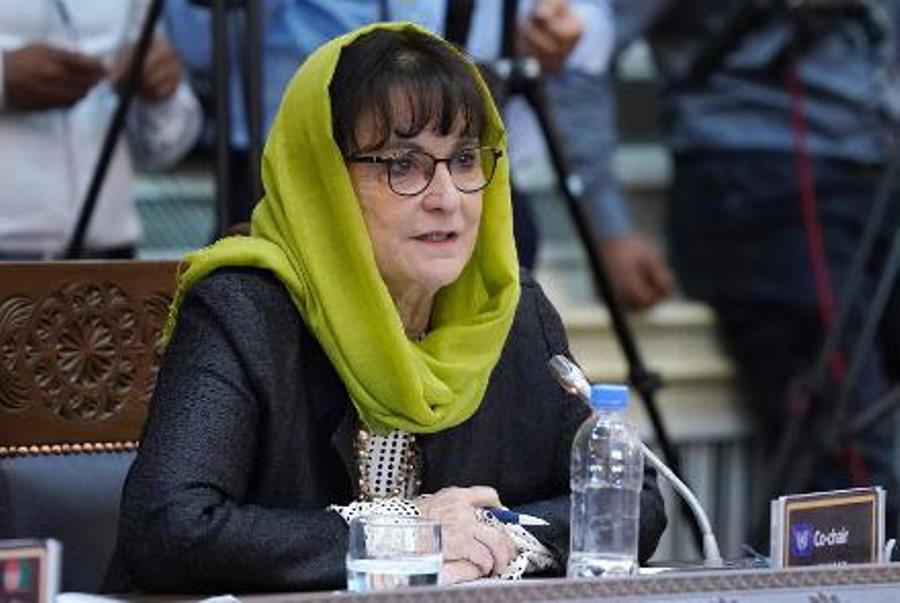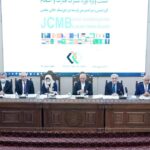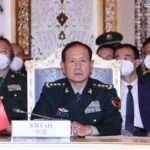Addressing the Joint Coordination and Monitoring Board (JCMB) meeting at the Presidential Palace on Wednesday, Deborah Lyons, the UN secretary general’s special representative for Afghanistan, said that if there is no progress in the peace talks the world will not work with the Taliban.
“If there is no movement at the negotiating table, and instead human rights abuses and worse still atrocities occur in districts they control, the Taliban will not be seen as a viable partner for the international community,” said Lyons.
Lyons said that the meeting takes place in extraordinary circumstances, with work to preserve the gains never more urgent or challenging.
“With the territory they have taken the Taliban have inherited responsibilities. The world is watching closely how they are acting, especially towards civilian populations, women, and minorities. The Taliban have gained a certain legitimacy in recent years through their negotiations in Doha, but this legitimacy is premised on their commitment to a political negotiation with the Government of Afghanistan, a commitment which their battle-focused strategy casts into doubt,” said Lyons.
“No major donor will finance the repression of women, let me say that again, no major donor will finance the repression of women, nor any major donor will finance the discrimination of minorities, the denying of education to girls, or the decrees of an authoritarian government,” said Lyons, adding: “They cannot do so, not only because these are against the norms of the United Nations and international community, but because a society built on these restrictions cannot and will not function for its citizens.”
The UN envoy addressed the other challenges facing Afghanistan:
“Eighteen million Afghans today are facing dire humanitarian needs. That is twice the number of the same category last year. It represents half the country. As we sit in this room today, we must have foremost on our minds these 18 million Afghans, who in the height of a hot summer, endure a fourth wave of COVID (like so many other countries around the world) endure a persistent drought, and intensified fighting that has killed among the highest number Afghans ever —as reported in our recent UNAMA Mid-term review on Protection of Civilians.”
She also said that: “donors seek reassurance from Afghanistan government that it recognizes the nature of the current crisis and that it has a strategic outlook that addresses it.”
In the meantime, Afghan President Ghani at the meeting also said: “We believe in the future of Afghanistan,” adding that “today’s Afghanistan has really changed.”
“I offered a bridge to peace through the holding of early elections,” President Ghani said. “The Loya Jirga took the unprecedented step of releasing 5,000 hardened Taliban fighters and some of the largest drug dealers under the assurance of good conduct by the international community.”
“Today’s war is not a civil war,” Ghani said, adding that “it’s the war of the networks.”
“I assure the international community that the people of Afghanistan don’t want anti-government elements,” Ghani said.
Religious scholars from various countries, including Pakistan, have said that the “current war in Afghanistan is not a religious war,” he added.
Ghani stated: “There is no military solution to the country’s issue,” adding that the Afghan government believes in a political settlement.
“The only solution for the Taliban is a political agreement that satisfies all the people,” he mentioned.
Referring to the announcement to withdraw foreign troops from Afghanistan by September 11, President Ghani said: “We respect the US President Biden and NATO’s decision on troops withdrawal.”
“We have never asked President Joe Biden and NATO to change their decision over their troop’s withdrawal from Afghanistan,” he said, adding that “Afghans should make their future on their own.”
“The departure of the international forces gives us the opportunity to frame and implement our sovereignty strategies in the manner suited to our unique conditions and history as well as the benefits of regional connectivity and global cooperation,” he added.
“We have cut the national budget by 5.2% to eliminate waste, prioritize the use of condition-based assistance, ensure delivery of essential services and free resources for our national defense,” he stated.
He also praised the Afghan security forces for defending their country in the ongoing war.











